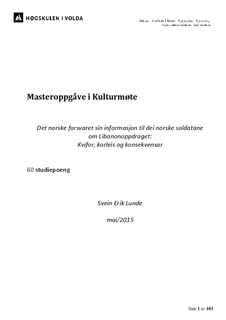| dc.description.abstract | Summary
More than 20.000 norwegian soldiers took part in the UN mission in Lebanon, UNIFIL, in the years 1978 to 1998. The Norwegian Defence gave a lot of information to this soldiers. Before they left Norway it was done through brochures. In their time in Lebanon they were informed through UNIFILs own monthly publication “Litani”, and through Norways own monthly “Blue Beret. The purpose of my master thesis is to find what was the purpose behind this information, how was it given, and what was the result or consequenses. First a background is given. The sitiation in Lebanon has to explained through the history of the last 100 years, at least from the collapse of the Ottoman Empire in 1921. Then the story behind UN sending peace-keeping forces around the world most be told. In the Korean War this forces were under the command of USA. In the Suez-crisis in 1956, UN decided that the forces had to be under UN command. This was also done when the UNIFIL forces were established through a UN Security Concil mandate given in march 1978. My findings is that Norway tried to be strictly neutral to the different actors in the conflict in Lebanon. Beacause the Norwegian people had sympati towards Israel, the information had to stress neutrality. Here the Norwegian Defence succeeded in their jobs. Few, if any, findings can point to sympathy or antipathy towards any part. But the attitude of the soldiers changed, from sympathy with Israel to nearly the opposite when they returned to Norway. The Norwegians solidiers lived among civilians in Lebanon, in their villages. The question I will try to answer is how this modern western european soldiers acted towards the natives, who lives in what can be described as nearly “middle ages”. Will we find “eurosentrism” among the soldiers The results of my findings may be ashtonising, the Norwegian soldiers and the natives did understand each other well, and lived respectfully together in their daily-life. The Norwegians got lectures in Arabic from well-educated local teachers, and gave lectures in English in return. The Norwegians also employed the locals, and did shopping from the local merchants, on equal terms. About fifty marriages between local girls and Norwegians soldiers were also a result. An explantion why this was so successfully may be the self-image of the Norwegians. They did not consider themselves warriors, but citizens in uniforms. | nb_NO |
